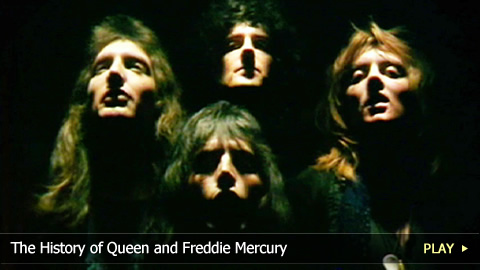The History of Queen and Freddie Mercury

advertisement
VOICE OVER: Rebecca Brayton
Comprised of vocalist Freddie Mercury, guitarist Brian May, drummer Roger Taylor and bassist John Deacon, Queen formed in London, England in 1971. With hits such as "Bohemian Rhapsody", "We Are the Champions", "Crazy Little Thing Called Love", and more, Queen is one of the world's best selling artists. They have incorporated many different genres into their music and in turn have influenced many other musicians. In this video, http://www.WatchMojo.com takes a look at the history of the British rock band, Queen, which formed in 1971.
"Queen"
Comprised of vocalist Freddie Mercury, guitarist Brian May, drummer Roger Taylor and bassist John Deacon, Queen formed in London, England in 1971. After a few delays, the band introduced their innovative style on their 1973 self-titled debut album. Though critically well-received, it sold poorly in the U.S.
"Killer Queen"
The next year’s follow-up effort suffered a similar fate, though Queen II did give the band their first UK hit, “Seven Seas of Rhye.” Building momentum, Queen released a third album, Sheer Heart Attack, in November 1974. With more radio-friendly songs, this was their first commercially successful album, helped by the single “Killer Queen.” Moving away from the progressive rock sound of their earlier work, the band was developing what would become the classic Queen sound.
"A Night at the Opera"
1975’s A Night at the Opera increased Queen’s mainstream recognition and became one of the band’s most successful albums. Debuting in the Top 5 on both the UK and U.S. charts, it featured the Mercury-penned mega-hit “Bohemian Rhapsody.” The short film that accompanied this song is often deemed the first true music video created for promotional purposes.
"News of the World"
Their popularity grew with their next few albums. 1976’s A Day at the Races hit the top spot in the UK off the strength of the gospel-inspired single, “Somebody to Love.” That same year, Queen famously played a free concert in London’s Hyde Park to a record-setting crowd of 150 thousand. By 1977, Queen was ready with News of the World, the album that spawned such anthems as “We Will Rock You,” and “We Are the Champions.”
Live Shows and Their Best-Selling Album
Riding the high, Queen released Jazz in 1978, which featured the singles “Bicycle Race,” and “Fat Bottomed Girls.” Live Killers was a 1979 live album that showcased the band’s unparalleled live performances. However, it was 1980’s The Game that became Queen’s bestselling album in the U.S., supported by the tracks, “Another One Bites the Dust” and “Crazy Little Thing Called Love.” They also opened the 80s by composing and recording the soundtrack for the science fiction film, “Flash Gordon.”
Greatest Hits and David Bowie
Keeping up the pace in 1981, Queen became the first major rock band to play in Latin American stadiums, and released their first Greatest Hits album. They also teamed up with David Bowie to record the single, “Under Pressure,” a song that would later appear on their 1982 record, Hot Space.
Decline in Popularity
1984 marked the inevitable start of a decline in the band’s U.S. popularity. Though their ’84 album The Works featured two hit singles, “Radio Ga Ga” and “I Want to Break Free,” it did not sell well in the States.
Wembley Stadium and Last Shows with Freddie Mercury
The next year, Queen performed what was arguably their best ever live show at London’s Wembley Stadium for Live Aid. They finished 1985 by releasing the song “One Vision,” which was featured on the next year’s album, A Kind of Magic. During the tour that followed, Freddy Mercury performed what would ultimately be his last show with Queen, at Knebworth Park in July 1986.
AIDS Rumours
By 1988, the flamboyant vocalist of Queen had grown thin and emaciated. Rumors began to spread that he had AIDS. Rejecting the story, Mercury and Queen released two more albums, The Miracle in 1989 and Innuendo in ’91. However, Mercury made his final public appearance with Queen at the BRIT Awards in 1990.
Mercury's Death and Resurgence of Popularity
By November 23rd, 1991, Mercury could no longer deny the rumors about his health. A day after confirming to the public that he was suffering from AIDS, he died of bronchial pneumonia. The band regained prominence soon after with the re-release of “Bohemian Rhapsody,” and with that track’s memorable inclusion in the 1992 film, “Wayne’s World.”
Last Mercury Album and John Deacon's Retirement
Queen’s final album with Freddy Mercury, Made in Heaven was released in 1995. The Queen Rocks compilation came two years later, and featured one new song, “No-One But You (Only the Good Die Young).” In 1998, shortly after the remaining members of the band performed the Queen track “The Show Must Go On” live with Elton John, bassist John Deacon retired.
Queen Shows with Guest Singers
Between 1998 and 2009, Brian May and Roger Taylor kept the Queen legacy alive by performing with various guest singers, most notably Paul Rodgers of Bad Company fame. Billed under the name Queen + Paul Rodgers, the group toured in 2005 and released their first album, The Cosmos Rocks, three years later. After an amicable split from Rodgers, May and Taylor began planning Queen’s fortieth anniversary, which would be celebrated in 2011.
Legacy
Today, the band can be found on the list of the world’s best-selling artists. With a style that incorporated rock, opera, heavy metal and more, Queen’s music will continue to transcend both genre and time for years to come.


